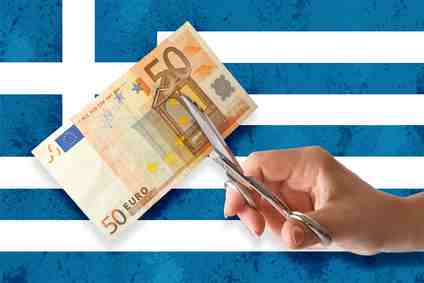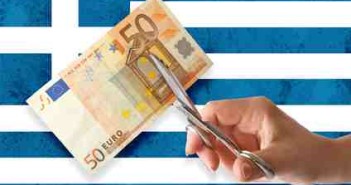It seems that European politicians will do everything to avoid this scenario – a break of European unity. But interesting times call for creative solutions, especially as there could be so many benefits for one of the strongest symbols of unity – the Euro.
Greece is on the brink of default. Yields on two year notes are at 25%. Even the ECB has abandoned Greek paper. They were the last active buyers out there. German Chancellor Angela Merkel is already preparing the public for the previously denied possibility of a Greek restructuring.
So maybe she’ll take one step forward and push for Greece to leave the Euro-zone? European leaders have called for unity – this includes politicians such as Merkel and Sarkozy, and senior officials such as Trichet and Rehn.

But it’s not what the people want.
The Germans, Finns, Dutch and other citizens of rich European countries find the funding of failed European states quite annoying. A subsidy here, a bailout there, and more concessions all the time. Patience is running out as these steps just don’t seem to work. A year after the bailout, and no improvement in sight.
Also the citizens of the troubled countries aren’t pleased, to say the least. The Greek economy is squeezing under austerity, and riots have been seen more than once. The Greek people aren’t feeling that the IMF and the EU are helping them, to say the least.
Ireland’s case is more extreme – the country’s finances were very solid. It’s the banks that got into trouble. But the government took over the banks, and now the Irish taxpayer has to pay with severe austerity in order to cover up for the banks’ debt to German, French and British banks. They don’t like it whatsoever…
The ECB’s policy leans towards the stronger countries, which enjoy strong growth and might suffer from inflation. With widening gaps between the rich and poor, it’s becoming impossible to keep everyone under the same umbrella.
What would a departure achieve?
- Merkel would gain credibility: She has been accused of lacking leadership, and her party is struggling in local elections. Making such a bold move will win her a lot of points towards the general elections. This move will be popular with voters.
- More Unity: Throwing out one of the member states isn’t an act of unity, but the current situation of huge gaps between the countries that share the same currency isn’t a sustainable union. Without Greece, the gaps will be smaller.
- A More Competitive Greece: The Euro makes Greece uncompetitive. A return to the Greek drachma will see a quick devaluation of the old/new currency, making it more attractive for investors that want to export, and for tourists.
- A Stronger Euro against inflation: Without Greece, the Euro will be stronger. This can curb inflation by making imports, especially of oil, cheaper. With less inflationary pressures on Germany, the ECB won’t need to raise the rates, helping the other vulnerable countries have the much needed low lending rates.
- Saving other countries: Apart from the aforementioned advantage of a stronger Euro, the Greek departure, if done right, could deter other countries from reaching the same situation. By “done right”, the terms should include not only a return to the drachma, but some additional limits on Greece within the European Union. For example, some limits on banks could serve as means of keeping the union more tight.
